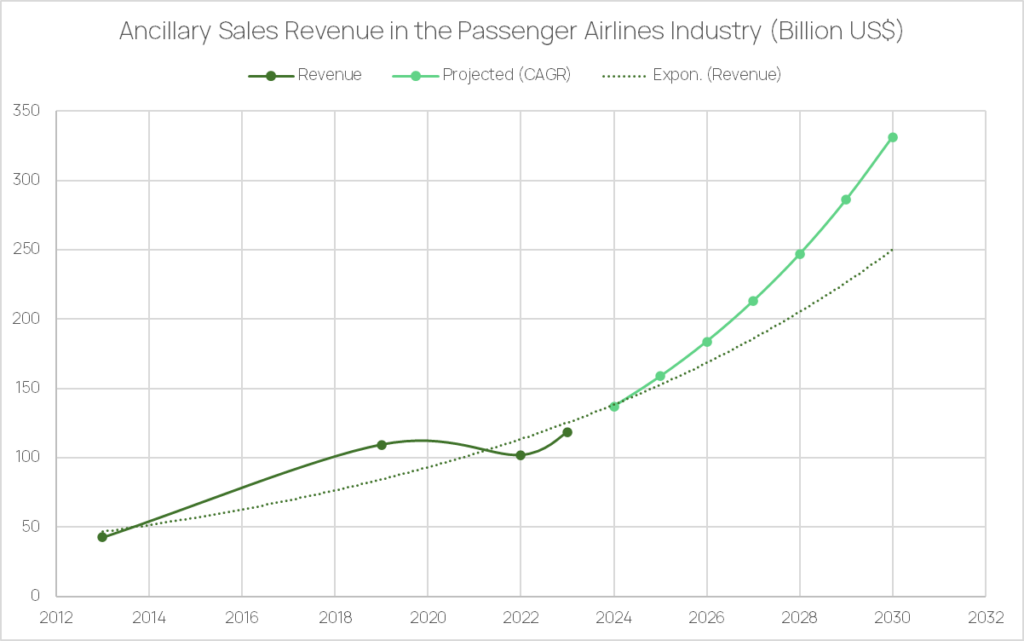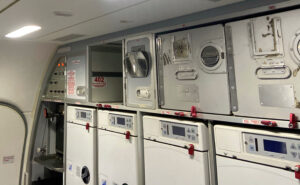Why Ancillary Revenue Is No Longer “Extra” But Essential for Airlines

The airline industry has long been characterized by razor-thin profit margins, volatile fuel prices, and ever-shifting consumer demand. In this high-stakes environment, ancillary revenue has evolved from a supplementary income source to a crucial pillar of airline financial sustainability. Airlines that fail to capitalize on diverse ancillary revenue streams risk falling behind in an increasingly competitive landscape.
The Evolution of Ancillary Revenue
Traditionally, airlines relied primarily on ticket sales for revenue. However, increased competition, regulatory changes, and the rise of low-cost carriers (LCCs) have exerted downward pressure on fares. To maintain profitability, airlines have embraced a variety of non-ticket revenue streams, which now contribute a significant share of their total earnings.
Industry reports indicate that some low-cost carriers generate over 40% of their total revenue from ancillary sources, while full-service carriers are also experiencing a growing portion of their earnings from non-ticket sales. This trend underscores the strategic importance of ancillary revenue in modern airline business models.
In 2022, ancillary revenues reached a historic high, accounting for approximately 15% of total airline revenue, according to OAG. This trend continued into 2023, with the top 10 airlines generating $54.1 billion in ancillary revenue, surpassing the $38.4 billion recorded in 2019. A significant driver of this growth is in-flight retail advertising, which MarketsandMarkets highlights as a key contributor to ancillary income.

Beyond advertising, in-flight catering services have also seen substantial growth. Grand View Research reports that catering services alone generated $16.01 billion in ancillary sales in 2022, with a projected compound annual growth rate (CAGR) of 5.9%. The Business Research Company further reports that the in-flight catering market is expected to expand from $16.96 billion in 2023 to $18.33 billion in 2024, representing an 8.0% CAGR. This growth is fueled by factors such as increased air travel, evolving dietary preferences, and a heightened focus on service quality. Projections suggest that the market will reach $25.39 billion by 2028, with an 8.5% CAGR, spurred by trends like enhanced health and safety measures, global cuisine diversification, demand for instant services, and a growing premium market. Notable trends in catering include on-demand services, personalization, a focus on health and wellness, sustainability efforts, and luxury offerings.
A broad estimate suggests that ancillary revenue may grow to between 250 and 330 billion US dollars by 2030.
Key Ancillary Revenue Streams
Airlines generate ancillary revenue through various streams, including:
- Baggage Fees: Passengers pay for checked and carry-on baggage, particularly on domestic and short-haul flights.
- Seat Selection and Upgrades: Travelers opt for preferred seating, extra legroom, and premium cabin upgrades.
- Onboard Sales: Food, beverages, Wi-Fi, and duty-free shopping enhance in-flight revenue.
- Loyalty Programs: Partnerships with credit card companies, hotels, and retailers create value.
- Travel Services: Offering car rentals, hotel bookings, and travel insurance through their platforms.
- Advertising and Sponsorships: In-flight entertainment, magazines, and digital channels provide another revenue source.
- Subscription Models: Emerging trends like unlimited flight passes and paid membership programs offer additional income.
Why Ancillary Revenue Is Essential
Ancillary revenue is essential for airlines due to its ability to:
- Generate Higher Profit Margins: Unlike ticket sales, which are often constrained by fuel costs and regulatory pricing, ancillary products typically have lower associated costs, leading to higher profit margins.
- Provide Revenue Stability: This revenue stream offers airlines financial insulation against external shocks, such as economic downturns, fuel price hikes, and global crises like COVID-19.
- Enhance Customization and Passenger Experience: Personalized offers powered by data analytics allow airlines to cater to individual passenger preferences, enhancing customer satisfaction while boosting revenue.
- Offer a Competitive Advantage: While low-cost carriers pioneered the unbundled pricing model, full-service airlines are now leveraging similar strategies to remain competitive and profitable.
- Monetize Every Customer Touchpoint: From the moment a passenger books a ticket to post-trip engagement, airlines have multiple opportunities to generate revenue through tailored services and offers.
The Future of Ancillary Revenue
As the airline industry continues to face increasing pressures, ancillary revenue has emerged as a cornerstone of financial stability and growth. By diversifying income sources beyond ticket sales, airlines can not only enhance profitability but also improve the overall passenger experience. The ability to personalize offers, leverage new technologies, and capitalize on evolving customer expectations will define the future of air travel. Airlines that embrace these opportunities will be better positioned to thrive in a competitive market, turning challenges into growth opportunities and ensuring long-term success.

I set out to build a realistic simulation of an airline, something that could mimic the operational, logistics and business aspects as well. That meant not only creating some random routes and inventory. I wanted to simulate airline strategy: which cities should be connected? should an airline select? What would the operating costs be—from airport […]

Earlier this month, Neurologistica had the privilege of participating in the World Travel Catering & Onboard Services Expo (WTCE) 2025 in Hamburg. As a premier event in the travel catering and onboard services industry, WTCE provided an excellent platform for us to present our latest innovations and connect with industry leaders. Introducing NL-TRACK: Revolutionizing Container […]

We are pleased to announce that Neurologistica has officially joined the Microsoft for Startups Founders Hub program. This strategic collaboration represents a significant milestone in our ongoing commitment to delivering innovative, technology-driven solutions in the logistics sector. About the Partnership By becoming a member of the Microsoft for Startups Founders Hub, Neurologistica will have access […]

The airline industry has long been characterized by razor-thin profit margins, volatile fuel prices, and ever-shifting consumer demand. In this high-stakes environment, ancillary revenue has evolved from a supplementary income source to a crucial pillar of airline financial sustainability. Airlines that fail to capitalize on diverse ancillary revenue streams risk falling behind in an increasingly […]

Introduction In the complex ecosystem of in-flight retail, the simple act of buying a snack, a perfume, or a gift during a flight is the visible tip of a sophisticated supply chain iceberg. Behind every product sold on board, there are multiple actors involved — manufacturers, distributors, airlines, and On-board retailers — each playing a […]

In an industry defined by rapid changes and fierce competition, airlines are constantly looking for ways to stay profitable. A recent paper by José Jaume, Gustavo Alonso, and Arturo Benito from the Universidad Politécnica de Madrid offers fresh insights into how airlines can manage their businesses more effectively. The paper, titled “A Model for Managing […]

Neurologistica ÖU was officially founded on Wednesday, February 26, 2025. The company is actively developing the Neurologistica system and the NL Track application for advanced container tracking. The launch of these solutions is planned for mid-2025, aiming to enhance logistics efficiency with innovative technology. More updates to follow as development progresses.

